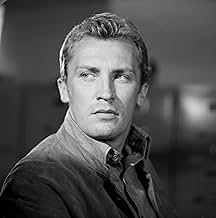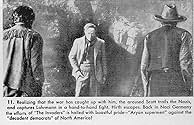Ajouter une intrigue dans votre langueA World War II U-boat crew are stranded in northern Canada. To avoid internment, they must make their way to the border and get into the still-neutral U.S.A World War II U-boat crew are stranded in northern Canada. To avoid internment, they must make their way to the border and get into the still-neutral U.S.A World War II U-boat crew are stranded in northern Canada. To avoid internment, they must make their way to the border and get into the still-neutral U.S.
- Réalisation
- Scénario
- Casting principal
- Récompensé par 1 Oscar
- 9 victoires et 2 nominations au total
Avis à la une
When a German submarine is destroyed in Hudson Bay, Canada, the surviving Nazi soldiers led by the fiercely patriotic Kommandant Bernsdorff (Richard George) must navigate their way across the country into the then-neutral United States of America. The native citizens they meet along the way are largely jovial and laid-back, many hardly aware of the war raging across the Atlantic, and the Germans haughtily deem them foes unworthy of the Fuhrer's might. But these Canadians, as placid as they first seem, can surely recognise fascism when they see it, and each of the soldiers is picked off one by one, like the characters from a war-themed version of Agatha Christie's "And Then There Were None." Among the unwitting local patriots is French-Canadian trapper Laurence Olivier a caricature but an entertaining one anthropologist/author Leslie Howard, and grinning deserter Raymond Massey, each of whom shows the Nazis that they're dealing with an enemy whose sheer spirit overshadows all of Hitler's armies combined.
The film was apparently intended as a tribute to Canada's involvement in the war, and perhaps as was Hitchcock's 'Foreign Correspondent (1940)' a call-to-arms for the then-isolationist United States, who would hold back until the Japanese attack on Pearl Harbour in December 1941. Many of the film's characters remark upon the sheer remoteness of the war relative to their own lives, unaware that it is actually standing before them; this idea was almost certainly aimed at American audiences. After the brilliantly suspenseful first act at Hudson Bay, I initially felt that the film was going off track by continuing to follow the Germans after their aerial departure from the remote village. However, as time wore on, I began to appreciate what the film was aiming for. Though the snow-swept slopes around Hudson Bay may seem leagues away from the Canadian/American border, Kommandant Bernsdorff and his ever-dwindling band gradually progress their way south, until, not only does he reach the border, but he physically crosses into the United States. The War had never been closer.
Although the general point of the film, particularly aimed at the Americans, is that the Nazis are evil and should be opposed, Nazis are in fact the central characters, and it could be argued that Lt. Hirth (Eric Portman) is the hero. Although he is clearly not a nice person and displays many of the cliched trappings of the stereotypical evil Nazi, he is portrayed sympathetically in some ways. It is possible to sympathise with him and his men because they are lost and alone in a foreign country which they cannot comprehend and where no-one can comprehend them. The war is shown not as a simple battle between absolute good and absolute evil, but as a clash of cultures. Hirth belongs to a German tradition of loyalty, obedience and service to the state which is much older than Hitler. He genuinely cannot understand the concepts of democracy, liberalism and individualism, and is completely bewildered by the lifestyle of the Hutterite community, asking not only "who is your leader?" but "what's the salute?". He is an idealist who believes that he and the rest of the Nazis know what is best for everyone. In Powell's view, the war is not just about democracy against dictatorship, but also liberalism against authoritarianism, individualism against conformity and, above all, pragmatism against idealism.
The way the conflict is illustrated through the German sailors' encounters with diverse Canadians is subtle, intelligent and highly effective. The Canadians are not portrayed as heroes. They have very human failings. They are mostly complacent, ignorant, and hypocritical. They try to bury their heads in the sand and pretend the war isn't happening until they are forced to make a decision by their unexpected encounters with Hirth and his men. Johnny, the French-Canadian fur trapper (Laurence Olivier, horribly miscast), comes across as arrogant and obnoxious, and seemingly has little interest in the war. Scott (Leslie Howard) is appallingly smug, hypocritical and self-absorbed, avoiding involvement in the war by retreating to the Rocky Mountains. Although he is fashionably disdainful of the Nazi leaders, he is unmoved by what they have done in Europe. He is only shaken out of his complacency when the Germans vandalise his books and paintings! Significantly, Hirth crows that " we kicked him out of the Reich years ago" as he burns Thomas Mann's latest book. Scott must have been aware of the sufferings of Thomas Mann and others in Nazi Germany, but felt no need to do anything about it.
The overall result is that although the individual Canadians are not heroic, they eventually make up their minds and join the fight against Nazism (as Powell hoped the Americans would). They each have their own reasons for this, reasons which are often selfish, ambiguous and prosaic. In this, they are the antithesis of the disciplined and idealistic Hirth. It is made clear that those who oppose the Nazis are not merely fighting out of blind loyalty to their countries, but nor are they fighting for any abstract ideal. Democracy is not portrayed as an ideal, but as a pragmatic solution: the worst system apart from all the others. The liberal democratic society of the western world is shown up as a mess, but it is a reasonably happy mess. It is superior to the nightmare of Nazi Germany precisely because it is pragmatic, flexible and individualistic. People are free to live their lives as they choose without an authoritarian government telling them what is best for them. For these reasons, 49th Parallel has an enduring resonance.
Vogel's defection to the Hutterites emphasises the humanity of the Germans and the fact that they were not all enthusiastic Nazis. But ironically, in leaving the Nazis, Vogel loses his sense of duty and becomes as hypocritical and self-obsessed as the Canadians. Although Vogel is not sympathetic to the Nazi cause and shows remorse for his involvement with it, he is not proposing to fight against it. He merely wants to hide from reality with the Hutterites and carry on baking bread, regardless of the outside world. His wish to go back to "how things used to be" is essentially the wish of an adult overwhelmed by reality to return to childhood. In this sense, as well as in the more literal military and legal senses, he is a deserter.
Overall, this is an exceptional film, despite some wooden acting and poor continuity, which gives the impression of drastic and ill-advised cuts. For example, in one scene the Germans are stealing a car, and in the next scene they are on a train, with no clue given as to what happened in between. It is not properly explained how the remaining two escaped from the crowd in Banff, and it seems far too easy for Hirth to get on to a plane and fly to Ontario. The scenery is magnificent (and magnificently shot) and the action is genuinely exciting, although the ending is completely absurd. 49th Parallel works as art and entertainment as well as propaganda, in contrast to Nazi films of the same era. The propaganda element is subtle and intelligent, making wider points which are still relevant today. The ultimate testament to the superiority of western liberal democracy is the fact that this film was made in the way it was and allowed to be shown. In an authoritarian dictatorship, Powell would most likely have been shot for treason for making a "propaganda" film so ambivalent and unflattering to the cause it was meant to promote. Narrow minded Nazis (like Hirth) would have been unable to grasp the deeper truths and humanist values at its heart.
Le saviez-vous
- AnecdotesOn a trip home to Wales, Niall MacGinnis was stopped and searched by police. He was arrested as a German spy when the police found a photo in his wallet of MacGinnis dressed in a German sailor's uniform, standing next to what appeared to be a U-boat. In fact, it was a publicity photo from MacGinnis' role in this movie. MacGinnis spent several days in jail before documents were sent from London verifying that he had been in the movie.
- GaffesWhen the train is going over the railroad bridge at Niagara Falls ostensibly traveling from Canada to the U.S., it actually is heading from the U.S. into Canada. The water in the Niagara River under the bridge in the scene is coming toward the camera, with the train moving across the bridge from left to right. Canada would be on the right in the shot, the direction the so-called U.S. bound train is traveling.
- Citations
[first lines]
Prologue: I see a long, straight line athwart a continent. No chain of forts, or deep flowing river, or mountain range, but a line drawn by men upon a map, nearly a century ago, accepted with a handshake, and kept ever since. A boundary which divides two nations, yet marks their friendly meeting ground. The 49th parallel: the only undefended frontier in the world.
- Crédits fous(Spoken introduction) "I see a long straight line athwart a continent. No chain of forts, or deep flowing river, or mountain range, but a line drawn by men upon a map nearly a century ago, accepted by a handshake and kept ever since. A boundary which divides two nations yet marks their friendly meeting grounds, the 49th parallel, the longest undefended frontier in the world."
- Versions alternativesThe initial American release had many cuts made to avoid upsetting some special interest groups. the running time was cut from 123 minutes to 104 minutes. Most of the submarine's voyage up to Hudson Bay was removed. They dive after sinking the freighter (and filming her crew) and we next see them in the Bay, preparing to send the raiding party ashore. All the scenes of them entering the Bay, including the reference to "his charts" (the missionary's), were cut. They cut all references to the "flying missionary" who was a German spy, the scenes with the map and all of it. They also cut the other "delicate" passage there, where Hirth tells the captive Canadians that the Eskimos are sub-apes like Negroes, only one step above the Jews, and the ripostes from Johnnie and the Factor. Obviously they didn't want to offend southern segregationists or anti-Semites by showing that Nazis shared their racist views, or leave in any dialogue decrying same.
- Bandes originalesAlouette
(uncredited)
Traditional French folksong
Sung to accompaniment of accordion by Laurence Olivier
Meilleurs choix
- How long is The Invaders?Alimenté par Alexa
Détails
Box-office
- Budget
- 132 000 £GB (estimé)
- Durée
- 2h 3min(123 min)
- Couleur
- Rapport de forme
- 1.37 : 1





























